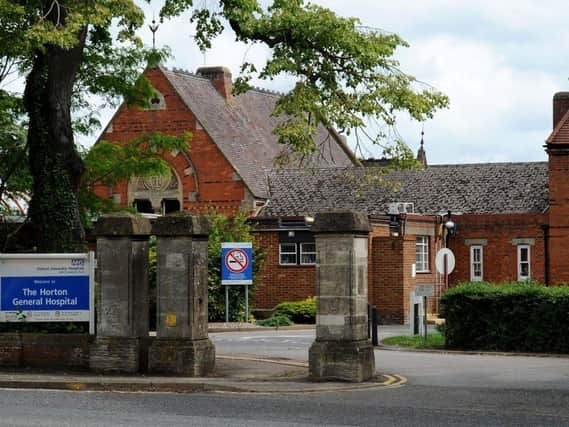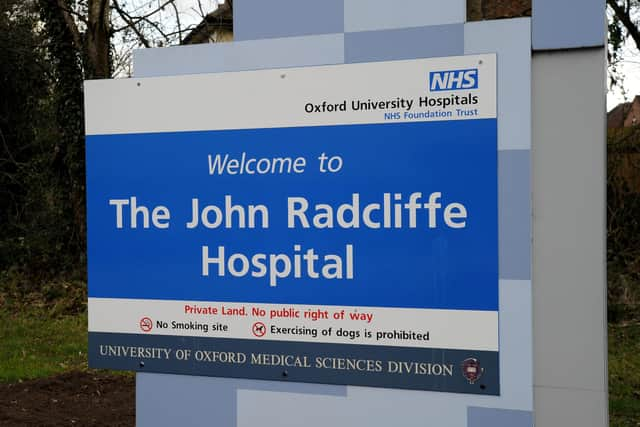Doctors to strike again in Banbury this week - one consultant says he is 'tempted' by work in Australia


The BMA has announced a further four-day junior doctors’ strike from 7am on Friday to 7am on Tuesday and a 48-hour consultants’ strike from 7am on Thursday, August 24 to 7am on Saturday, August 26.
The strikes are about pay, which has dropped in real terms, and conditions as the NHS struggles because of austerity measures.
Advertisement
Hide AdAdvertisement
Hide AdA senior consultant told the Banbury Guardian he could earn twice as much in Australia as in the UK.


“For me it's an inexplicable drive to want to lead, drive necessary changes, make things better,” the consultant said.
“I was quoted a negotiable salary up to AUS$ 500k for a comparable role in Melbourne. The current exchange rate is 1.9 dollars to the pound. I have seen some jobs advertised (particularly in rural locations) for $350-700k negotiable.
“I'm dedicated to the NHS but was very tempted by the opportunities offered in Australia. It’s not just the pay, but the conditions - the other vital ways in which healthcare professionals are made to feel valued and are supported to do the job they long to do well.
Advertisement
Hide AdAdvertisement
Hide Ad“Someone put it this way recently - as a senior clinical leader in the NHS I am loaded with the responsibility but am not given the necessary authority. No authority- because of the way hospitals are run. It’s almost like power is deliberately kept out of the hands of senior doctors.
“I think everything in Australia’s health system makes your job nicer to do. There is a good work-life balance. There is proper support to do continuing professional development with a decent budget to go to conferences, specialist training courses etc.
“The doctors there work typically fewer hours than their UK counterparts. Colleagues report feeling valued and esteemed in the community; family all get access to public and private healthcare (there's a dual funding system). The cost of living lower and there are good education opportunities. Often recruitment teams help with basics of housing, getting bank accounts sorted and such like.
“We don't see that very often with the international medical graduates we rely on in the NHS.
Advertisement
Hide AdAdvertisement
Hide Ad“There's more flexibility in taking your leave - they are not so stretched for staff that you're made to feel guilty for taking the leave you're entitled to. Other packages such as travel benefits and relocation expenses are available too. Morale sounds a lot better, so even when it's busy, the teams are supportive and you feel better able to cope.
"I enjoyed the educational pathway but clinical leadership is the thing that keeps calling me. For me it's an inexplicable drive to want to lead, drive necessary changes and make things better,” the consultant said.
The NHS in Oxfordshire, Bucks and Berks West said it is working to prioritise resources to protect emergency treatment, critical care, neonatal care, maternity, and trauma, and ensure priority for patients who have waited the longest for elective care and cancer surgery.
"The NHS will only reschedule appointments and procedures where necessary and will rebook immediately, where possible. Unfortunately, these strikes will affect planned and routine services,” a spokesman said.
Advertisement
Hide AdAdvertisement
Hide Ad“Patients who have a scheduled appointment should attend as planned unless they hear from the NHS directly that the appointment has been changed.
“In the meantime, people can help by using 111 online https://111.nhs.uk/ to get the best service for their needs, ensuring prescriptions are up to date and looking out for vulnerable family and friends.
Dr Nick Broughton, interim Chief Executive of the NHS Buckinghamshire Oxfordshire and Berkshire West Integrated Care Board, said: "We are now entering the ninth month of industrial action across the NHS and staff continue to provide patients with the best possible care under the circumstances.
“NHS staff working during the industrial action will be working hard in hospitals, community teams, GP services and pharmacies to keep people safe and respond to their needs. This period of industrial action is taking place during the peak of the summer holidays so there may be added pressure on some services. We really appreciate people's understanding and co-operation during these challenging periods.
Advertisement
Hide AdAdvertisement
Hide Ad"Emergencies, critical care, maternity, trauma and neonatal care safe staffing will be our absolute priority, but it will involve the NHS working together across Buckinghamshire, Oxfordshire and Berkshire West to ensure we are there for people at their moment of need. We are grateful to all our colleagues working during this time to keep services running and patients safe.”
Dr Rachael de Caux, Chief Medical Officer for the NHS in Buckinghamshire, Oxfordshire and Berkshire West and consultant in Emergency Medicine said: “If you have an emergency or life-threatening need, continue to come to Emergency Departments. We expect them to be very busy during strike action so if your need is not an emergency you can expect to wait a very long time or be redirected to a more appropriate service. NHS 111 online remains the best place to help you get to the part of the NHS that can best respond to your needs.”
Please remember:
- Continue to access GPs as normal
- Call 111 to get the right service for your needs
- Make sure prescriptions are up to date
- Stay safe and look out for vulnerable family and friends
- Keep appointments unless you are contacted by the NHS with alternative arrangements.
Remember A&E is for emergencies and life-threatening situations.